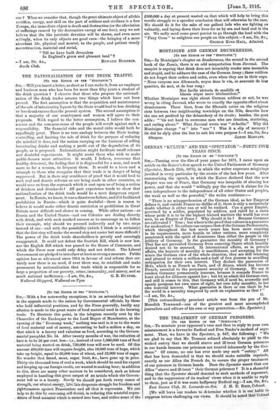THE NATIONALIZATION OF THE DRINK TRAFFIC. [To THE EDITOR OP
TITI " SPECTATOR.") you insert a letter, as short as I can make it, from an employer and business man who has been for more than fifty years a student of the drink question ? I observe that those who propose the nationali- ' zation of the drink trades assume two things which have not been proved. The first assumption is that the acquisition and maintenance of the sale of intoxicating liquors by the State would lead to less drinking or less drunkenness than the present system. The second assumption is that a majority of our countrymen and women will agree to their proposals. With regard to the latter assumption, I believe the con- science and the common-sense of the people will revolt against such a responsibility. The financial risks and the moral risks would both be appallingly great. There is no true analogy between the State taxing, controlling, and limiting the sale of drink for the purpose of reducing the mischief it does, and the nation carrying on the business of selling intoxicating drinks and making a profit out of the degradation of its people, as is proposed. Nationalization might facilitate small reforms and doubtful experiments. It might assist those who wish to make public-houses more attractive. It would, I believe, overcome that healthy deterrent, the feeling that it is disgraceful for a man, and much more so for a woman, to frequent them. It would be a boon and a; triumph to those who recognize that their trade is in danger of being- suppressed. But is there any semblance of proof that it would lead to such real and drastic reforms as are being made in other countries, or would save us from the reproach which is cast upon us of being a nation of drinkers and drunkards ? All past experience tends to show that nationalization of the drink trade would be a most dangerous experi- ment. In Russia, we know, it was a disastrous failure, and if it facilitated prohibition in Russia—which is quite doubtful—there is reason to believe it would make either drastic restriction or prohibition in Great Britain more difficult and slower in coming. While other nations—as Russia and the United States—and our Colonies are dealing directly with drink, and with such marked success as to encourage us to follow their example, why should we proceed indirectly and by two steps - instead of one—and with the possibility (which I think is a certainty) that the first step will make the second step not easier but more difficult ? The power of the drink trade shareholders is greatly and cunningly exaggerated. It could not defeat the Scottish Bill, which is now law, nor the English Bill which was passed in the House of Commons, and which the Peers now could only delay and not defeat. The Liberal Government are pledged to introduce at least as strong a measure. Public
• opinion has so advanced since 1914 in favour of real reform that cer- tainly now there is no need, if ever there was, to establish and make • permanent by nationalization that trade which is responsible for so large a proportion of our poverty, crime, immorality, and misery, and so
much national inefficiency.—I am, Sir, &c., G. B. HUNTER. Wallsend Shipyard, Walleend-on-Tyne


































 Previous page
Previous page